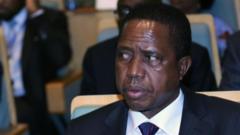Amidst escalating tensions, demonstrators clashed with police in Tbilisi as the Georgian government announced it would suspend its pursuit of EU membership, igniting widespread public outrage.
Protests Erupt in Tbilisi Following Georgia's EU Membership Suspension

Protests Erupt in Tbilisi Following Georgia's EU Membership Suspension
Thousands rally against government decision to halt European Union accession talks, signaling a shift toward closer ties with Russia.
As dawn broke on Friday morning, protests surged outside the Parliament building in Tbilisi, the capital of Georgia, reflecting deep discontent among citizens after the government's shocking declaration that it would suspend discussions on joining the European Union until 2028. Prime Minister Irakli Kobakhidze's announcement also specified the nation would forgo over $500 million in EU financial assistance, a move seen as a pivot towards Russia and China, driving a wedge between the ruling Georgian Dream party and pro-Western opposition groups.
Demonstrators filled the avenues, chanting phrases that resonated with feelings of betrayal and frustration, such as “slaves” and “Russians,” in reaction to the government's decision. The Ministry of Internal Affairs reported that officials responded with riot control measures, employing water cannons and tear gas to clear the protests that had blocked major roadways. The police confirmed 43 arrests of protesters during the unrest, with 32 officers reportedly sustaining injuries in the chaos.
Georgia, situated strategically at the crossroads between Europe and Asia, has long been a focal point of geopolitical interests. The current wave of protests has its roots in the contentious legislative elections from October, where the governing party faced allegations of electoral improprieties. With opposition leaders and citizens alike voicing their discontent, the demonstrations are expected to intensify as Georgia grapples with its future direction.
Demonstrators filled the avenues, chanting phrases that resonated with feelings of betrayal and frustration, such as “slaves” and “Russians,” in reaction to the government's decision. The Ministry of Internal Affairs reported that officials responded with riot control measures, employing water cannons and tear gas to clear the protests that had blocked major roadways. The police confirmed 43 arrests of protesters during the unrest, with 32 officers reportedly sustaining injuries in the chaos.
Georgia, situated strategically at the crossroads between Europe and Asia, has long been a focal point of geopolitical interests. The current wave of protests has its roots in the contentious legislative elections from October, where the governing party faced allegations of electoral improprieties. With opposition leaders and citizens alike voicing their discontent, the demonstrations are expected to intensify as Georgia grapples with its future direction.






















